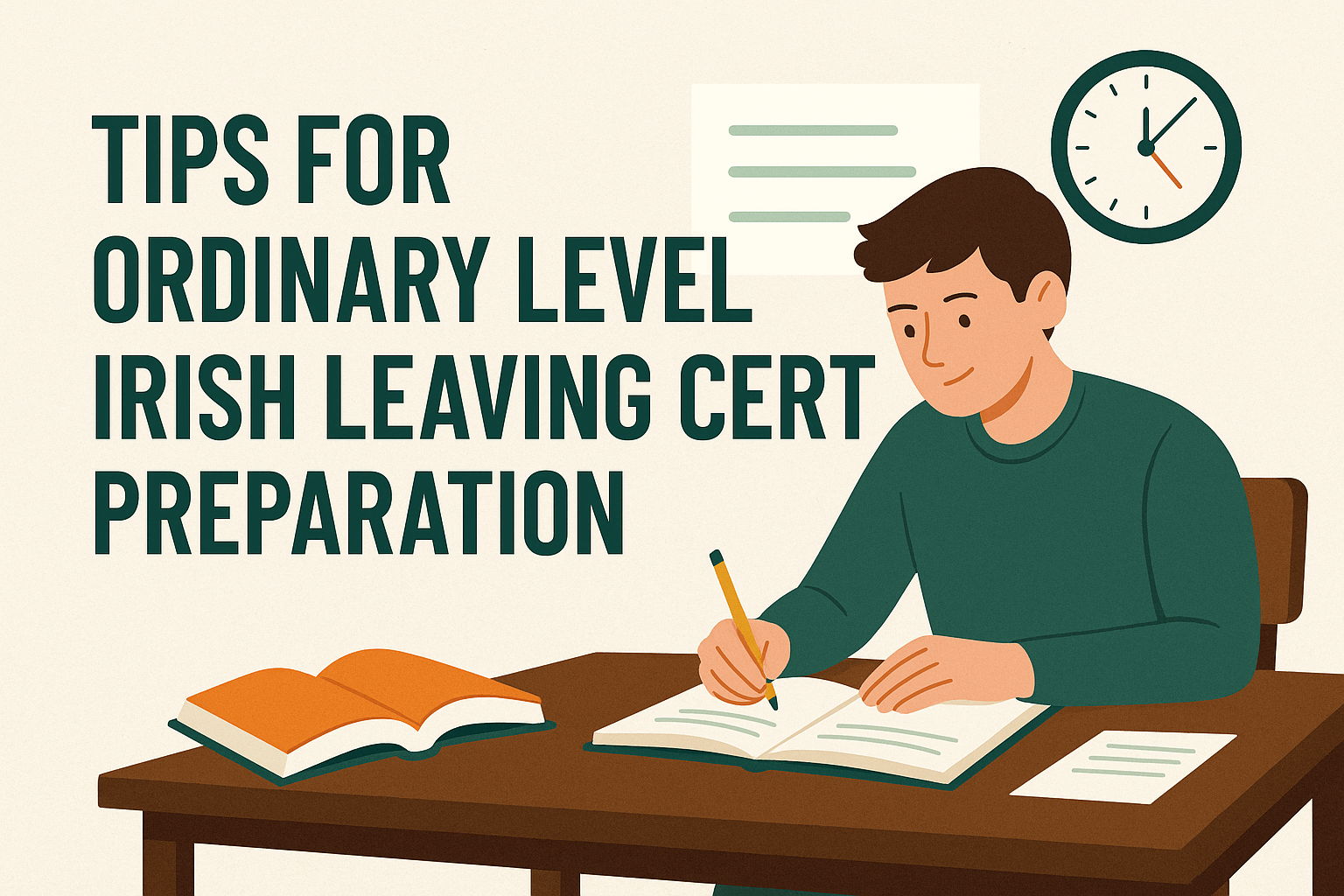If you’re preparing for the ordinary level Irish Leaving Cert, you’re probably feeling a mix of nerves and determination. Here’s some good news: with the right approach, you can do really well in this exam. These tips for ordinary level Irish Leaving Cert preparation will help you study smarter and walk into that exam room with confidence.
The ordinary level exam tests your practical communication skills, not perfection. Once you understand this, everything becomes easier. Whether Irish has been challenging for you or you just want to make sure you’re on the right track, this guide has you covered.
What’s Actually in the Exam?
Let’s break down what you’re facing. The ordinary level Irish Leaving Cert has two papers that count equally toward your final grade.
Paper 1 is all about communication:
- Your oral exam (worth 40% of everything!)
- Listening comprehension
- Written responses to what you hear
Paper 2 focuses on reading and writing:
- Reading comprehension passages
- Essay writing (prose)
- Poetry questions
- Grammar exercises
Understanding this structure helps you use your study time wisely. Many students spend all their time on written work and forget about the oral component—but that’s nearly half your grade!
Start Your Oral Prep Early
Here’s one of the most important tips for ordinary level Irish Leaving Cert students: begin your oral preparation now. Your oral exam happens in early spring, which comes faster than you think.
Set aside just 15 minutes every day for speaking practice. It doesn’t sound like much, but it makes a huge difference. Practice your pieces out loud until they feel natural. Record yourself on your phone and listen back—you’ll quickly spot where you need to improve.
How to Nail Your Oral Exam
Know Your Topics Inside Out
- Learn your chosen topics thoroughly
- Practice answering common questions
- Make your answers sound conversational, not robotic
- Have natural ways to connect your ideas
Practice With Real People
- Find a study buddy who’s also doing Irish
- Ask your parents or siblings to listen to your pieces
- Join a study group at school
- Try interactive practice tools that give you instant feedback
Build Your Confidence
- Start practicing months before the exam
- Remember: clear communication beats perfection
- The examiners expect some hesitation and mistakes at ordinary level
- Learn phrases that buy you time when you’re thinking
Reading Comprehension Made Simple
Reading comprehension seems scary, but it’s actually predictable once you know the pattern. The questions are usually similar from year to year, and here’s a secret: you don’t need to understand every word.
Always read the questions first. This tells you exactly what information you’re looking for. Then, as you read the passage, highlight anything that answers those questions.
Don’t panic when you see words you don’t know. You can usually figure out the general meaning from context. The ordinary level exam isn’t trying to trick you—it just wants to see if you can pull basic information from Irish text.
Studies from Irish educational institutions show that students who actively engage with texts (underlining, questioning, summarizing) score significantly higher. Building strong foundational skills through Irish language lessons for beginners helps develop these critical comprehension abilities early in your learning journey.
Writing Essays That Score Well
The good news about prose? You get to choose your topic. This is a massive advantage if you prepare properly.
Pick the Right Essay Type
You’ll usually see options for personal stories (scéal), opinion pieces (aiste), or informational writing. Choose whatever feels most natural to you. Love telling stories? Go for the narrative option. Better at arguing a point? Pick the persuasive essay.
Create Your Essay Templates
Develop three or four flexible frameworks you can adapt to different questions. This doesn’t mean memorizing entire essays word-for-word—examiners spot that immediately and it rarely fits the actual question. Instead, learn useful structures with key phrases you can adjust.
Watch Your Time and Word Count
For ordinary level, you need about 230-250 words. Practice writing to this length under pressure. Some students write way too much and run out of time. Others write too little and lose marks. Find your sweet spot.
Keep It Simple and Clear
At ordinary level, simple, correct Irish beats complicated Irish with mistakes. Use vocabulary and grammar you’re confident with. Examiners reward clear communication, not attempts at fancy language that falls apart.
Building Your Word Power
You don’t need thousands of words to succeed. Focus on high-frequency vocabulary that appears everywhere.
Organize words by topic:
- School and education
- Family and relationships
- Hobbies and interests
- Technology and social media
- Health and wellness
- Environment and community
Learn 30-50 key words for each topic, plus useful phrases. This targeted approach works way better than randomly memorizing dictionary pages.
Use digital flashcards with spaced repetition—they help words stick in your long-term memory. The Irish language flashcards method works brilliantly for visual learners. Also, check out common mistakes in Irish to avoid typical errors that cost students marks.
Poetry Without the Panic
Poetry intimidates lots of students, but ordinary level poetry questions follow a pattern. You’re usually asked about themes, imagery, your personal response, and sometimes technical stuff.
The trick? Study three or four poems really well instead of trying to cover everything lightly. For each poem, prepare:
- A quick summary of what it’s about
- Key images and what they mean
- Why you like (or don’t like) the poem
- Important lines that show the main ideas
- A bit about the poet if it’s relevant
When answering questions, quote directly from the poem. Even at ordinary level, examiners like when you back up your points with actual lines from the text.
Grammar That Actually Matters
Grammar feels overwhelming, but ordinary level focuses on the basics. Concentrate on these essentials:
Master Your Verb Tenses
Get comfortable with present, past, and future tenses for regular verbs and common irregular ones. The past tense shows up everywhere. If you need help, mastering Irish past tense provides step-by-step guidance.
Prepositions Are Everywhere
Prepositions and prepositional pronouns appear constantly. Understanding Irish prepositional pronouns helps with both comprehension and writing accuracy. Regular practice with Irish prepositions ensures you can use them correctly in various contexts.
Get Sentence Structure Right
Irish sentences work differently than English ones. Practice the VSO (Verb-Subject-Object) pattern that’s common in Irish.
Learn the Key Irregular Verbs
These verbs appear all the time: bí (to be), téigh (to go), déan (to do/make), feic (to see), abair (to say), faigh (to get), tabhair (to give), tar (to come), beir (to catch), and ith (to eat). For comprehensive coverage, check out the guide on Irish irregular verbs to master these essential forms.
Your Study Timeline
Success comes from consistent effort over time, not last-minute cramming. Here’s how to structure your preparation:
Three Months Before Exams
- Start intensive oral practice
- Review all basic grammar
- Begin reading sample comprehension passages
- Choose which poems you’ll study
Two Months Before Exams
- Complete your oral exam (usually March/April)
- Practice full essay compositions under time pressure
- Work through past exam papers
- Focus extra time on your weak areas
One Month Before Exams
- Review everything regularly
- Do complete practice papers under exam conditions
- Keep reinforcing vocabulary
- Maintain speaking practice even after the oral
Final Week
- Light review of key materials
- Practice staying calm and focused
- Double-check exam times and what you need to bring
- Get good sleep and eat properly
Use Technology to Your Advantage
Modern students have incredible resources that didn’t exist years ago. AI-powered platforms provide personalized practice, instant feedback, and learning that adapts to your level.
Interactive tools offer something traditional study can’t: immediate pronunciation feedback, grammar correction, and conversation practice without judgment. This makes quality Irish instruction accessible to everyone.
Mix digital tools with traditional study methods. Use apps for speaking practice, vocabulary drills, and comprehension exercises. This variety keeps you motivated and helps different types of learners.
Mistakes to Avoid
Learn from what trips up other students:
Don’t Ignore Your Oral
Despite being worth 40% of your marks, many students under-prepare for this. Start early and practice consistently all year.
Don’t Memorize Complete Essays
Examiners easily spot memorized essays that don’t fit the question. Prepare flexible frameworks instead.
Don’t Skip Past Papers
Past papers show you what examiners expect and help you understand question patterns. Do several under timed conditions.
Don’t Aim for Perfection
Ordinary level doesn’t require perfect Irish. Clear communication with some errors scores better than fancy language full of mistakes.
Don’t Cram at the Last Minute
Language skills develop gradually. Weekly practice over months beats intensive study the week before exams.
Exam Day Strategy
All your preparation comes down to exam day performance. Here’s how to show what you know:
For Every Exam
- Read all instructions carefully
- Divide your time based on how many marks each question is worth
- Answer everything—blank answers get zero points
- Keep checking the time
- Save a few minutes to review your work
For Reading Comprehension
- Read questions before the passage
- Don’t get stuck on difficult words—move on
- Answer in English or Irish as the question specifies
- Use evidence from the text in your answers
For Essay Writing
- Make a quick plan before you start writing
- Count your words to hit the required length
- Focus on clear communication over impressive vocabulary
- Proofread for obvious mistakes
Build Your Confidence Through Practice
The more you practice speaking and writing, the more natural Irish becomes. Many students find their anxiety drops significantly once they establish regular practice habits.
Form a study group with classmates at your level. Practicing together reduces pressure and provides support. Teaching concepts to others also strengthens your own understanding—if you can explain a grammar rule to someone else, you really get it.
Your Irish Journey Continues
Preparing for these tips for ordinary level Irish Leaving Cert represents an important milestone. While the exam is your immediate goal, the skills you’re developing—communication, cultural appreciation, linguistic flexibility—extend far beyond test day.
Thousands of students successfully complete this exam every year, including many who felt uncertain initially. With focused preparation, consistent practice, and the right support, you can achieve results that surprise you in the best way.
Whether you’re just starting to prepare or in your final weeks, these tips for ordinary level Irish Leaving Cert success give you a clear path forward. It takes effort, but it’s absolutely doable with the right approach.
Ready to supercharge your Irish preparation? The Gaeilgeoir AI platform offers personalized practice tools, instant feedback, and adaptive learning designed specifically for Leaving Cert students. Join thousands of learners who are improving their Irish with modern technology. Start your free trial today and discover how the right tools can make exam prep more effective and less stressful.
Go n-éirí an t-ádh leat – good luck with your studies!


